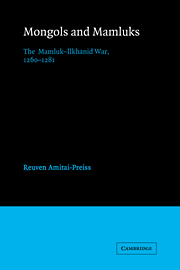Book contents
- Frontmatter
- Contents
- List of illustrations
- Preface
- List of abbreviations
- Notes on dates and transliteration
- Introduction
- 1 The historical background
- 2 The battle of ʿAyn Jālūt
- 3 The formulation of anti-Īlkhānid policy
- 4 The search for a second front
- 5 Military and diplomatic skirmishing
- 6 The secret war
- 7 Baybars's intervention in Seljuq Rūm
- 8 Baybars's posthumous victory: the second battle of Homs (680/1281)
- 9 The Mamluk–Īlkhānid frontier
- 10 Mamluks and Mongols: an overview
- Maps
- Genealogical Tables
- Glossary
- Bibliography
- Index
3 - The formulation of anti-Īlkhānid policy
Published online by Cambridge University Press: 23 November 2009
- Frontmatter
- Contents
- List of illustrations
- Preface
- List of abbreviations
- Notes on dates and transliteration
- Introduction
- 1 The historical background
- 2 The battle of ʿAyn Jālūt
- 3 The formulation of anti-Īlkhānid policy
- 4 The search for a second front
- 5 Military and diplomatic skirmishing
- 6 The secret war
- 7 Baybars's intervention in Seljuq Rūm
- 8 Baybars's posthumous victory: the second battle of Homs (680/1281)
- 9 The Mamluk–Īlkhānid frontier
- 10 Mamluks and Mongols: an overview
- Maps
- Genealogical Tables
- Glossary
- Bibliography
- Index
Summary
This country was very far from that land which those infidels had conquered, but [then] it became their neighbor. And thus, the people [of this country] had to fight [the infidels] and resist them. In order to do so, they had to obtain two things: a large army and a brave sultan [to lead them]. Without this, it is impossible to fight these infidels with all their conquests over the many lands, and their numerous men and armies.
Ibn al-NafisSyria at the commencement of Baybars's rule
Upon his accession to the Sultanate, Baybars was confronted with a deteriorating situation in Syria. Qutuz's governor in Damascus, Sanjar al-Ḥalabī, refused to accept the new order, rebelled and declared himself sultan of Syria. To the north, the senior amirs of Aleppo had quickly become disenchanted with Qutuz's appointee as governor, overthrown him and elected as ruler one of their own, whose loyalty to the sultan in Cairo was uncertain. As for the Mongols, just a few months after their defeat at ʿAyn Jālūt, they dispatched a large raiding party into northern Syria to reconnoiter and generally cause trouble. The Franks on the coast did not sit still, but also took advantage of the general disarray and launched an attack in early 1261. In addition, there existed several independent, and not necessarily friendly, political entities in Syria: the Ismāʿīlīs, the “emirate” of Ṣahyūn, and al-Mughīth ʿUmar's principality at Karak.
- Type
- Chapter
- Information
- Mongols and MamluksThe Mamluk-Ilkhanid War, 1260–1281, pp. 49 - 77Publisher: Cambridge University PressPrint publication year: 1995



